Python – The Best Language for Startup Programming

Choosing the right programming language for your startup is not an easy decision, considering the huge variety of available options. And it’s not enough to choose one just because it’s more popular, an experienced developer recommended it or a friend claimed it’s the best of the best. The choice of a programming language, especially for a startup, should be wise and based on sound reasons.
But why is it so critical?
The thing is, programming languages differ greatly from one another. They are used to meet various needs (e.g., PHP is intended mainly for web development, C is for low-level programming, and all-purpose languages like Python, Java, and JavaScript have their own special features). And since they have different syntaxes, each of them offers different performance levels.
If chosen properly, a programming language will help you and your startup:
- save time and money on the implementation of your ideas,
- scale the development team if necessary,
- scale the product, and easily implement new features, and
- easily and effectively support the product after its release.
If its language is not selected wisely, a startup may suffer tech-related problems from the very beginning such as over-budgeting, overestimation, and a lack of flexibility to follow the demands of the market. All of these may drown the whole startup under bad circumstances.
The Most Famous Python Startups That Became Giants
Many cool startups are built with Python, but leading companies of various industries also widely use this language in their applications and ecosystems. Here, we’ll tell you about some well-known projects that used Python at a startup stage and continue using it now.
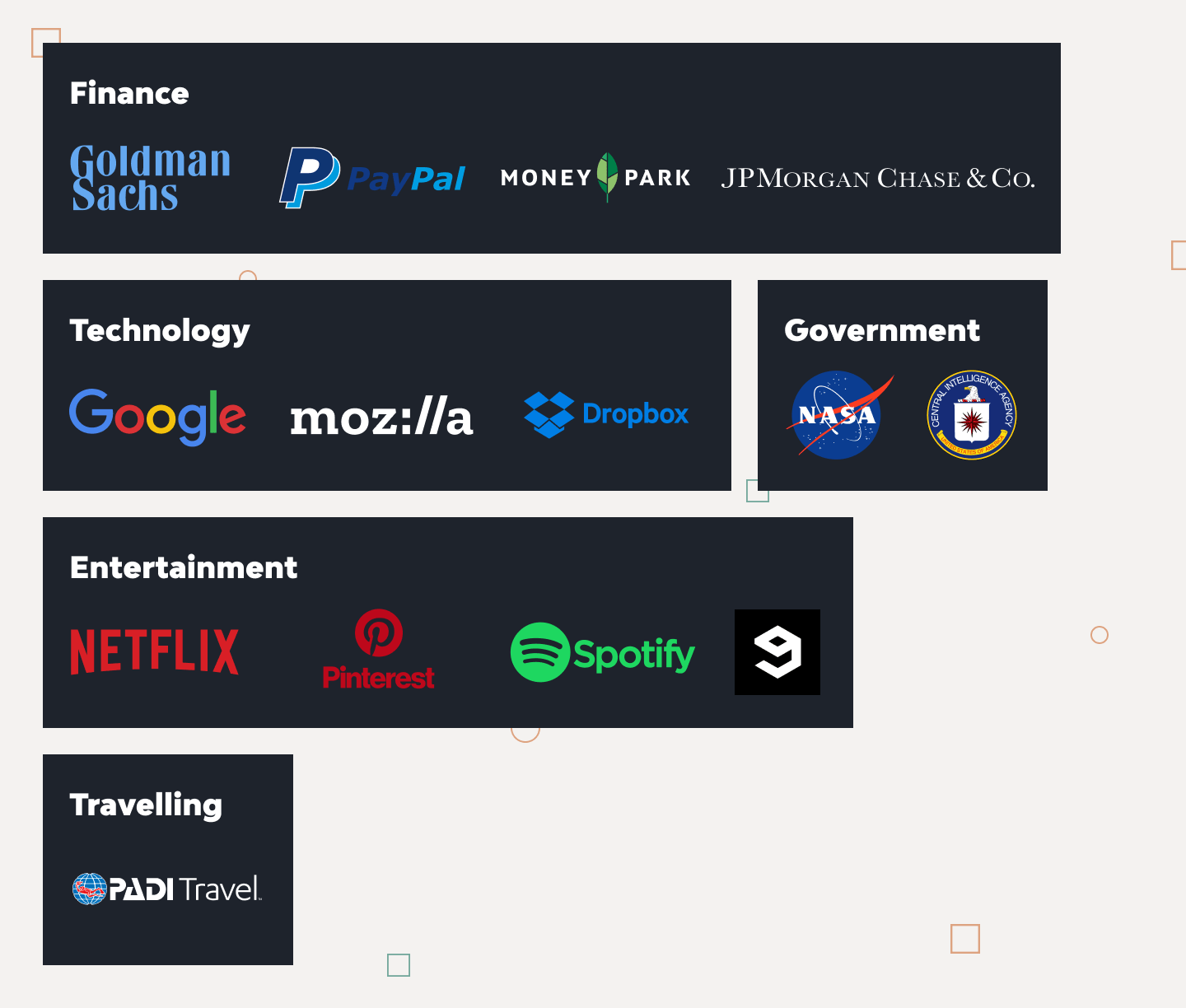
Google is the #1 search engine, which processes 5.9 million searches every minute and has over 1,9 trillion net worth.
Python was used as a primary project language in the first few years of its work. But even after the adoption of C++ and Java, Python remains one of the core languages used in Google App Engine search algorithms, many system administration tools, the Google recommendation engine, YouTube services, and numerous other projects and systems.
Netflix
Netflix is a leading streaming service worldwide, with over 230 million clients.
The company uses Python to analyze user behavior to provide a better experience. Also, Python is a core element of the personification tool that analyzes users’ viewing history and offers them movies and TV shows they like.
Moreover, Python is used for testing new features, automatizing processes, forecasting viewership and audience size, and many other internal tools.
Spotify
Spotify is a leading music streaming service worldwide. And as its creators claim, over 80% of its backend services are written in Python.
Python is also an indispensable element of Spotify’s AI recommendation system, Radio and Discover functions, and is widely used in data analysis and audience forecasting.
Amazon
Amazon is a top US e-commerce platform that is known all over the world, with over 1.6 trillion net worth.
Python is a primary programming language used in Amazon’s AI projects aiming to analyze target audience preferences and customer buying habits and offer additional goods and services.
Also, Python is used for analyzing bid data. It allows easy operation of huge amounts of data accumulated by Amazon and provides valuable market insights.
NASA
Yeah, the leading space agency has also been using Python for quite a while. It was and remains the primary tool for scientific calculations — it was used in all shuttle missions for data management and analysis.
Also, it’s vital in software developed for spacecraft, for example, for analyzing temperature parameters and creating heat maps. Python is an essential tool for space exploration.
***
Many big startups are still using Python even after becoming industry giants. It proves that this programming language suits small companies and international business leaders. Thousands of startups are using Python now, so why wouldn’t you?
Python Startups Developed with Django Stars
Except for the big startups that use Python, other successful companies that work with our team have also chosen Python/Django. Here are some of them:
- PADI Travel, the world’s biggest web resource for divers, a booking platform, a travel guide, and a social network.
- Festicket, a website to search for music festival tickets, and also one of the world’s largest music communities.
- Password Boss, a digital wallet and a password management system.
- Hudson, the global recruitment company, which has chosen Django to create its own CRM system.
- Prezi, an online drag-and-drop tool for creating presentations.
- MoneyPark, the first independent provider of personalized financial advice on mortgage and insurance products in Switzerland.
Top Programming Languages for Startup Development
The programming language you choose for your startup is a foundation of your product’s performance, scalability and, as a result, user experience, conversion, and future growth. Recently, a coding bootcamp Coding Dojo analyzed the most popular programming languages used by the worlds’ largest unicorn startups. Here are the top 5:
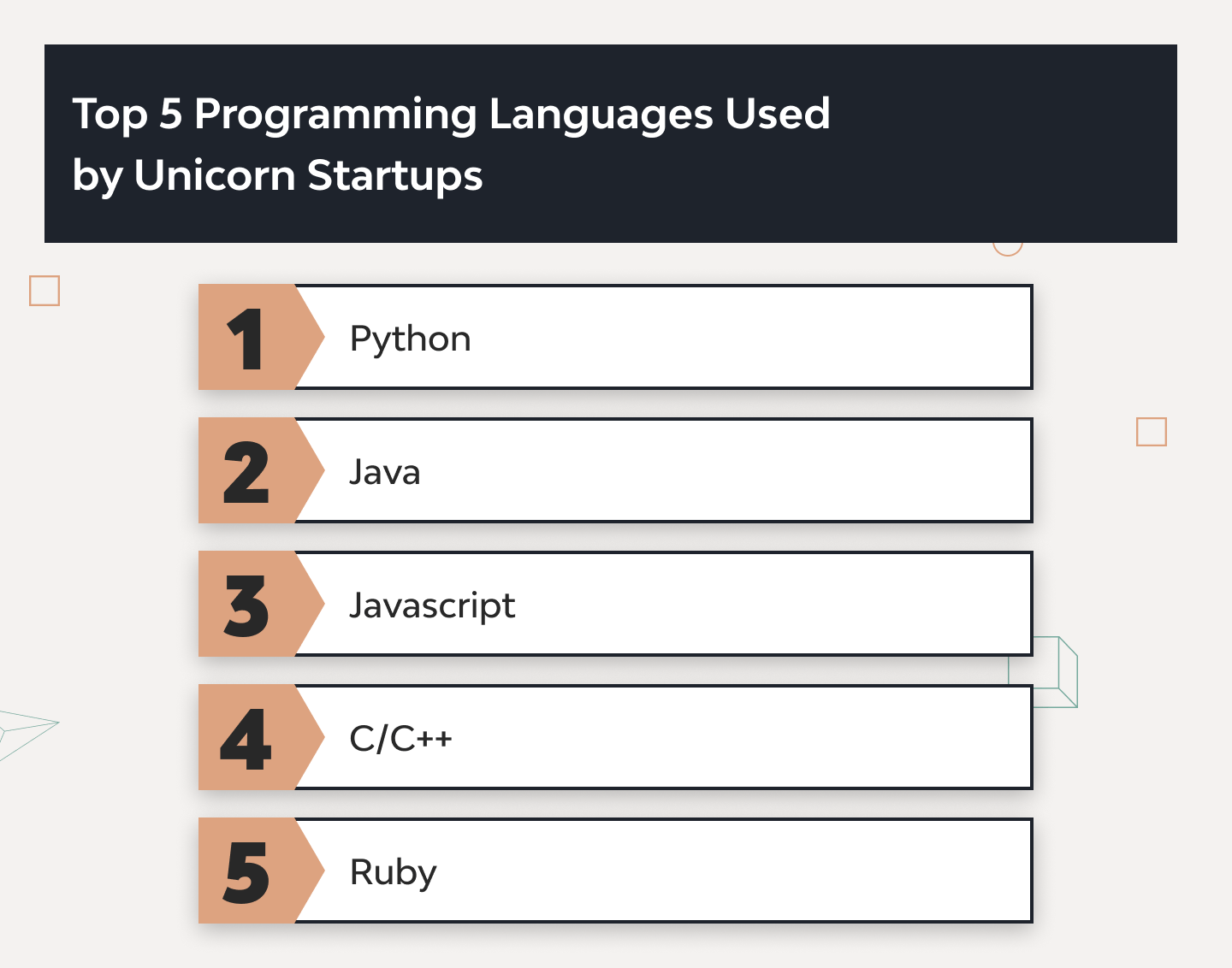
Let’s analyze the pros and cons and define the best language for startups.
Python

Python is the fastest-growing language in the world, and hasn’t slipped in popularity since 1991. Uses of Python language cover products of different sizes and complexity (data science, machine learning, and AI among them).
Here are the main pros and cons of this language for startups:
Pros
- Fast time to market
- Large community and detailed technical documentation
- Easy to learn
Cons
- Not native to a mobile environment
- High memory consumption
What is Python programming language used for? With Python, you can quickly develop an MVP and test your product on the market. Developers can easily reuse existing code and create the same functionality much faster. However, Python is not suitable for memory-intensive tasks and needs additional optimization for mobile apps. Find out the most famous apps made with Python.
JavaScript

JavaScript is a universal and constantly evolving programming language. It works for different types of applications such as mobile, web, desktops, gaming apps, chatbots, machine learning, etc. Its pros and cons for your startup include:
Pros
- Speed
- High server availability
- Variety of interfaces for better user interactivity
Cons
- No efficient security on the client-side
- Some new functionality is not supported by old browsers
In general, JavaScript is widely used to design interactive interfaces and dynamic web pages. You can use it for different industries and types of applications.
Java

Java is a high-level programming language often used for building enterprise applications that aim to scale in the future. Java is commonly used to create applications of different types.
Pros
- Write Once, Run Everywhere
- Security
- Has a great number of APIs
Cons
- Speed
- Doesn’t look native on the desktop
Java includes security as an integral part of the design and is considered to be the most secure programming language. If you aim to build a product with a variety of features, Java can accomplish different tasks such as networking, database connection, and XML parsing.
However, in comparison with C and C++, Java is significantly slower and memory- consuming.
C++

C++ is one of the oldest programming languages and is known as the mother of all languages. A lot of programming languages are built using C++ as the base.
Pros
- Combines features of both high-level and low-level languages
- Scalability
- Compatibility with C
Cons
- C++ is very specific and niche-oriented
In general, C++ is not the best choice for a startup, unless you have very specific performance requirements. When your goal is to quickly build an MVP, it’s better to choose another language that enables fast prototyping.
Ruby

Ruby is an open-source language that allows for simple and fast creation of web applications. Here are its benefits for your startup:
Pros
- Time-efficient
- Cost-effective
- Compatible with different technologies
Cons
- Slow performance
- Lack of flexibility
Ruby has a lot of default modules and plugins out of the box, which is great for standard functionality. However, if you want to develop a product with specific functionality, Ruby can be hard to adjust.
By the way, we recently wrote the post “Ruby on Rails vs. Django“. The article provides a detailed overview of the similarities and differences between the two frameworks, as well as the strengths and weaknesses of each, helping readers to determine which one is better suited for their specific needs.
Choosing a Startup-friendly Programming Language
Consequently, from what we’ve learned above, a startup-friendly programming language needs to help the company:
- build an MVP as quickly as possible to attract investment and test the hypotheses,
- easily implement new features,
- create fast iterations during the development process,
- scale the business,
- scale the development team working on the project,
- most likely, integrate with other software related to the product, and
- easily and effectively support the product after its release.
Python is often considered one of the best startup programming languages, as it satisfies all of these requirements.
Certainly, the choice of language depends on the type of product programming startups aim to develop and its owners’ business goals. This means that, despite Python’s versatility, in some cases another language will be more effective. It’s not about Python being unsuitable for certain kinds of products. It’s just that sometimes you can do the same things you can do with Python more efficiently using another language (e.g., if you need a streaming service). But, in 90% of cases, Python remains the most legitimate programming language for new companies, and our rich experience in product development proves this statement.
Reasons to Use Python for Your Startup
Having been in use for more than 30 years, Python is obtaining more and more admirers in developer communities all over the world. Forecasts say it’s on track to having an incredible amount of traffic by 2020.
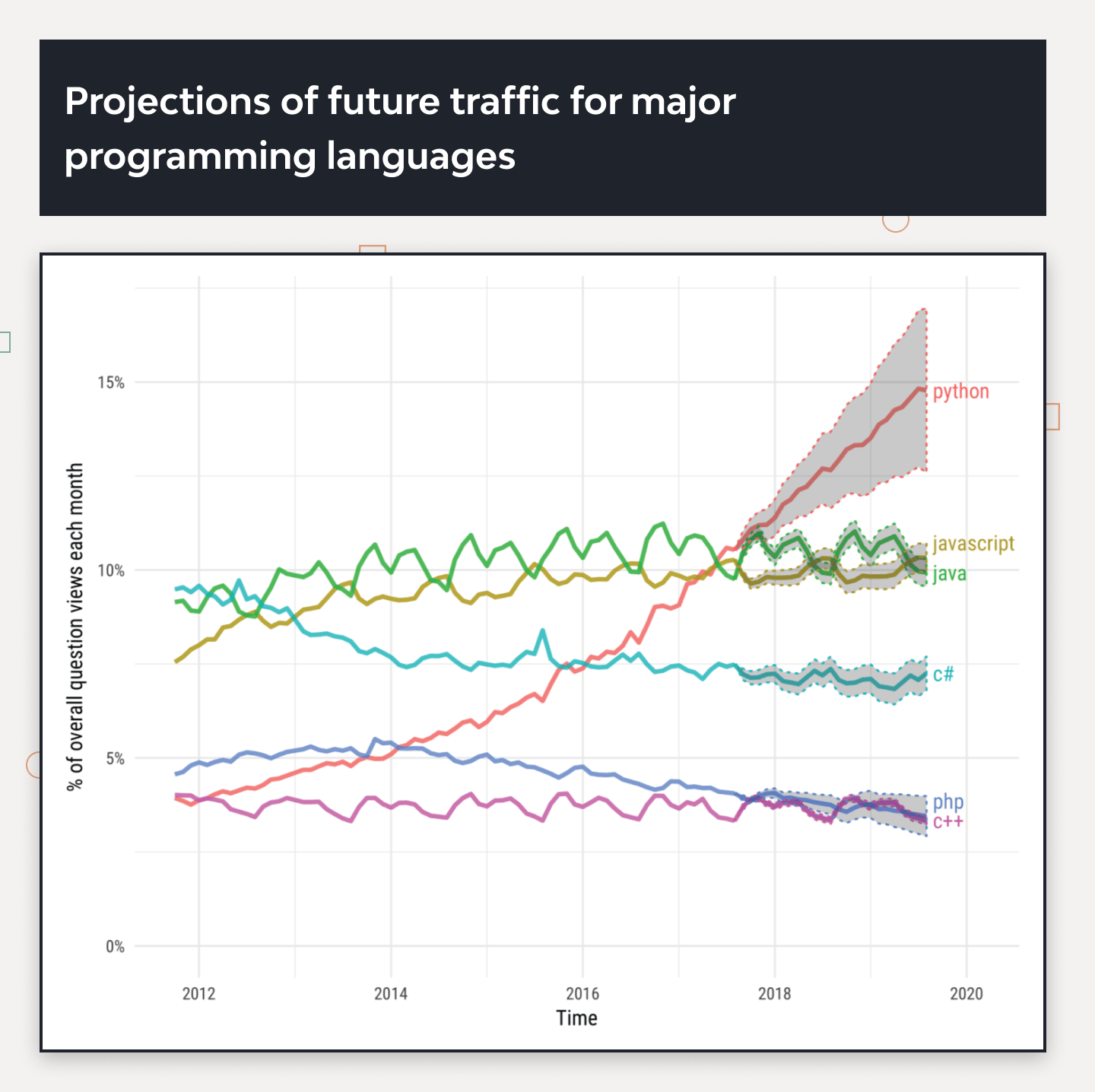
And here’s why so many people consider Python the best programming language for startups (by the way, in one of our other articles, we talked about why Vue.js is better for fintech).
1. It’s easy
One of the main things what Python is appreciated for is that it’s intuitive and quite easy to learn, compared to other programming languages. According to the Lifehacker’s poll, it’s the #1 Most Popular Programming Language for First-Time Learners.
2. It’s great for building MVPs and prototypes
What is Python used for in programming? Rapid development is one of the basic principles Python is based on. And yes, it is really considered one of the most productive languages, largely thanks to its code efficiency and the possibility for code reuse. Since it is easy and time-effective, the Python programming language is a good choice for MVP development services for startups, enabling rapid, highly functional builds to attract investors or test ideas with the target audience. This is one of its main advantages when it comes to startups.
Read: How to Build a Unique Technology for Your Fintech Product with Python
3. It’s time-tested, yet innovative
Python was established in the 1980s. This means it’s time-tested, but not yet outdated. On the contrary. Python is well known as one of the most innovative and versatile programming languages used to implement cutting-edge ideas, because it is open-source and, thus, is constantly replenished with new libraries and solutions.
4. It’s popular and universal
One of the direct consequences of high popularity is that Python has a huge number of admirers in every country. In turn, this means it’s easy to find Python developers for a project and replace them if necessary.
5. It has wonderful documentation and community support
Another advantage of Python that business owners often overlook is that it has one of the best stacks of technical documentation ever, as well as a huge and highly supportive community. This means that, whatever task you give your developers, they will not get stuck for a long time looking for a proper decision. They’ll be able to find one quickly. And, again, time is money.
6. It goes well with AI, ML, and BD
Is your project destined to deal with large loads of data? These are highly popular nowadays. Another piece of good news is that Python is the perfect choice for all types of development associated with big data, machine learning and/or artificial intelligence. This is because it has powerful packages intended for these types of tasks (like Panda and NumPy), and wide possibilities for data visualization through APIs.
Research says it’s one of the best uses for Python.
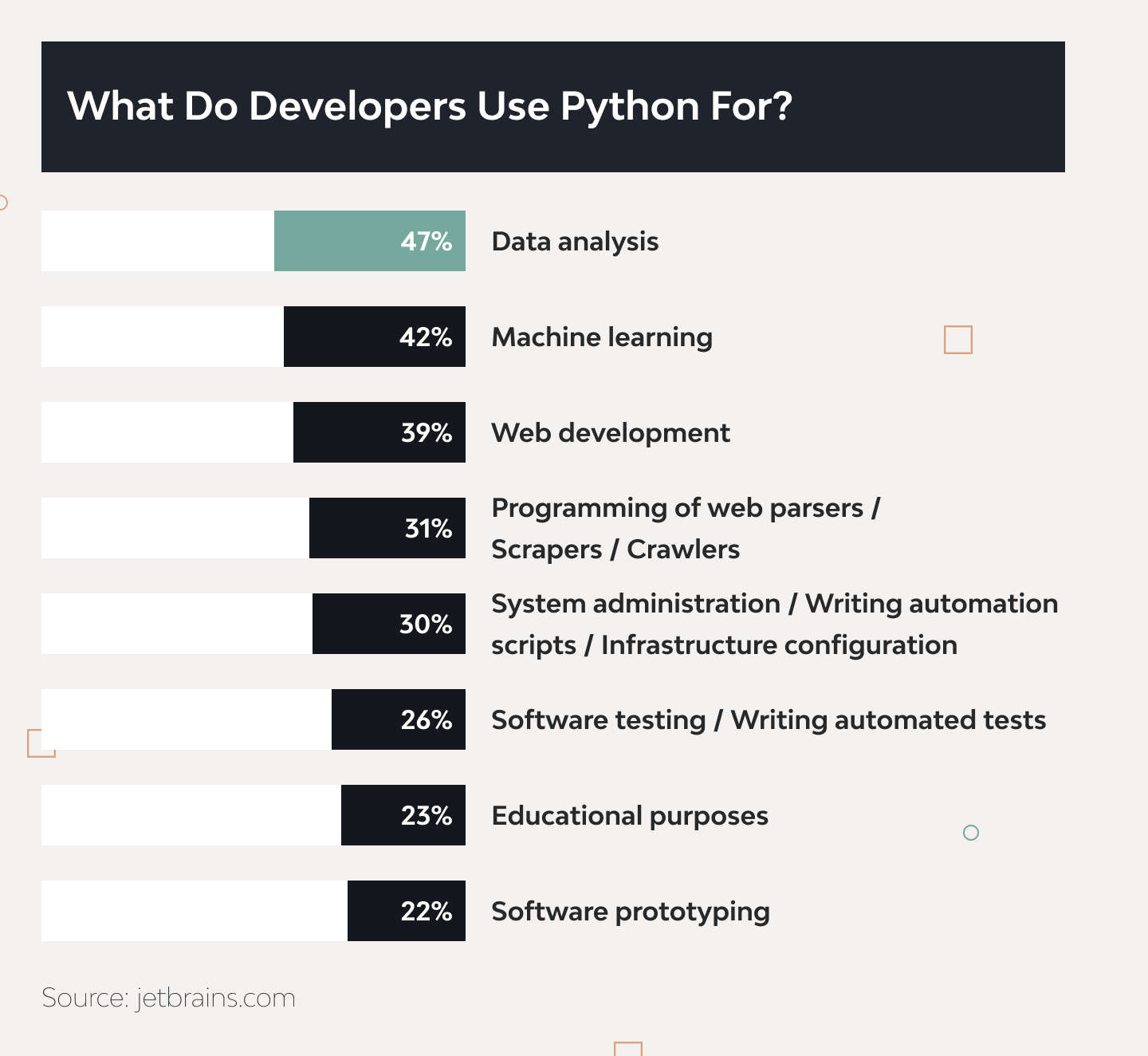
7. It’s open-source
Literally, this means that thousands of the best minds around the world are constantly building the platform. On the other hand, it also means that, as an open-source product, Python can be implemented anywhere you please, and modified to suit the needs of a specific project. Another thing that adds flexibility is Python’s incredible number of libraries (packages) which can be used by developers as elements in turnkey solutions.
8. It’s highly scalable
As mentioned earlier, it’s crucial for a startup to be ready for any kind of change, as well as quick growth. Python is famous for its simplicity: developers can easily overcome any obstacles and scale a project up or down, without having to deal with any time-consuming processes. That is why Python is the best programming language for scalability.
9. It doesn’t require a big team
Python is not bound up with a large amount of written code, which is why it allows developers to work faster. Even more important, it allows you to maintain a smaller development team than many other programming languages require. That’s really good news for a startup, because “fewer people” means “fewer expenses”.
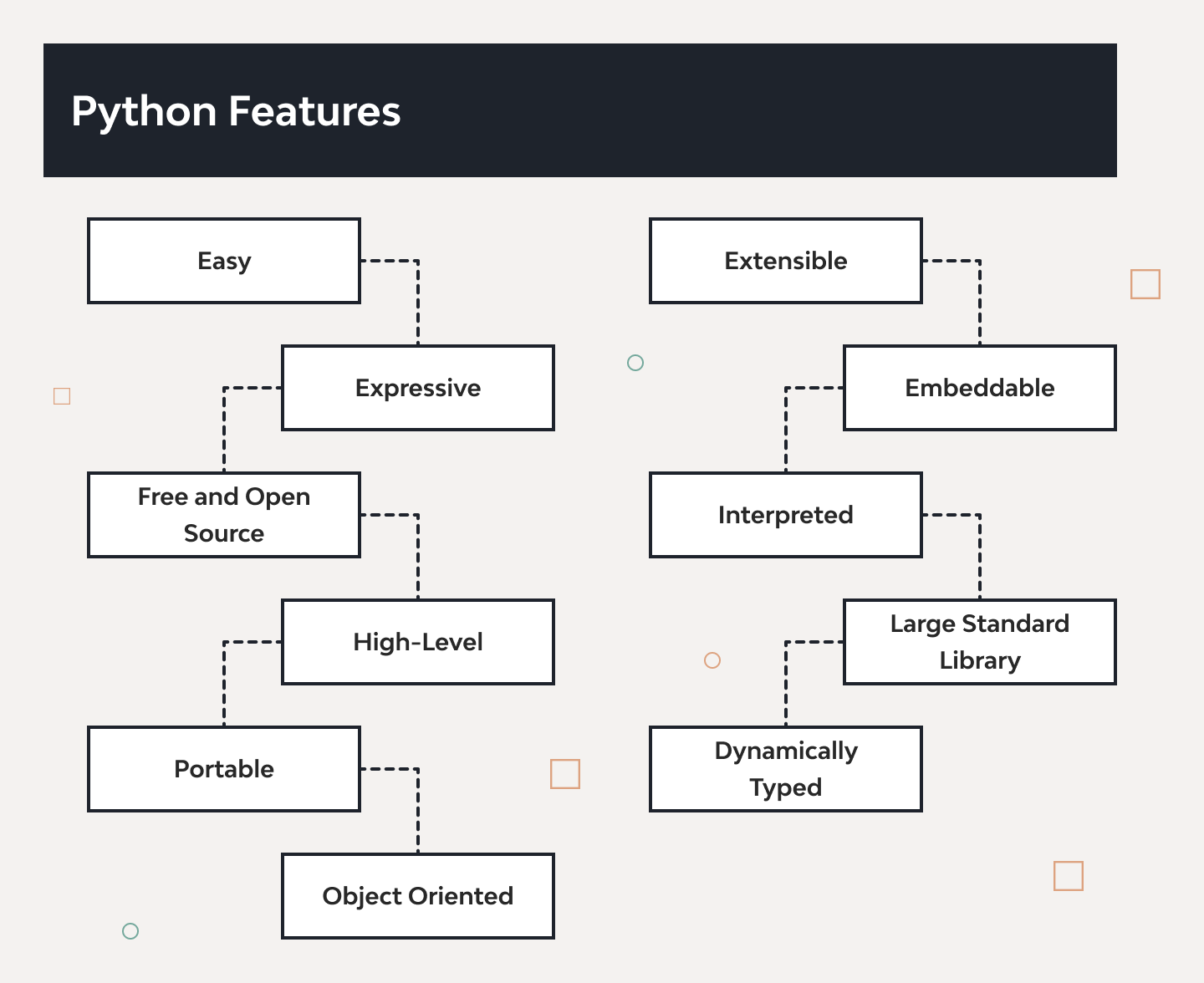
Summary
There are many programming languages. And, of course, each has its own advantages. It would be unfair and inaccurate to say there’s only one specific language worth your attention (otherwise, the others just wouldn’t exist).
That said, when we say that Python is the best programming language for a web startup, we mean it will give you:
- the potential to develop a quick MVP,
- easiness in finding product support,
- scalability and flexibility,
- a high level of security, and
- efficiency in terms of time and money.
Python, together with Django, is a combination that our team has tested far and wide for many years. And, as a technical partner, with each project we successfully complete using Python, we clearly see it’s the best choice to use to help a client launch a startup.








